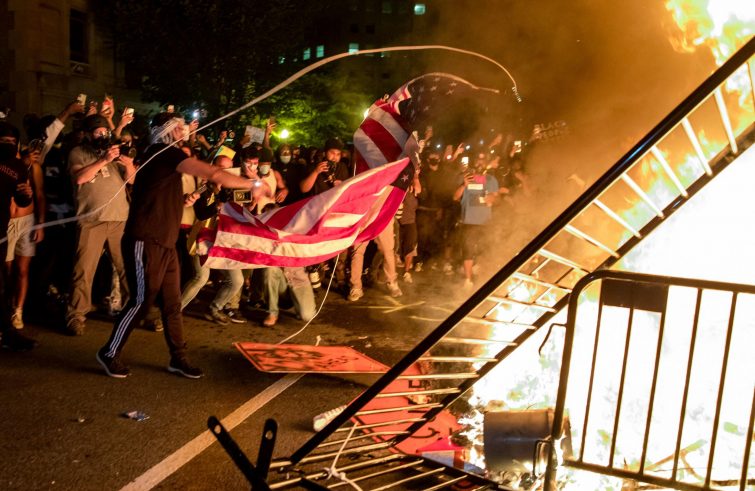
(from New York) The violent protests and mayhem spreading across the streets of some thirty cities in the United States and the many other peaceful demonstrations in the same number of major cities, and often simultaneously in the same urban area, show that
the death of George Floyd, an unarmed African-American killed a week ago by a police officer during an arrest in Minneapolis, has rekindled an age-old, unsolved debate on racism in America.
Over and above controversies regarding protesters’ tactics and who is and who-is-not involved, the brutal ways in which African-Americans are treated in the country, especially by the police, remain a core issue.
About 1 in 1000 black men in America can expect to die at the hands of police.
African Americans are twice as likely to be arrested and searched by the police compared to white men.
When they are killed, their murders are less likely to be solved. They are convicted and get longer prison sentences compared to white men according independent news outlet Vox. Racial disparities are not confined to criminal justice. Inequalities are very much present in many areas of American life, while the coronavirus has killed more African Americans and hit communities where they live with other minorities.
Floyd’s violent death is not an isolated case. A few days earlier, Breonna Taylor, from Louisville, Kentucky, was shot eight times by undercover officers who forced their way into her home unannounced. The young girl’s boyfriend, fearing a robbery, opened fire and the cops gunned down Breonna, an emergency medical technician. She had just turned 26. In Louisville, in addition to vandalizing various buildings, protesters broke the windows in the cathedral rectory, whose stained-glass windows are now covered with large plywood boards. Archbishop Joseph E. Kurtz, who lives in the rectory, in a letter to the mayor, had expressed his support for the peaceful protests that “give voice to the pain of the community and to the desire for truth and justice to be served”, while condemning the “senseless violence” that developed the night of May 28 when protestors chanted “No justice, no peace” as they made their way through the streets, until tear gas from the police, supposed to disperse the crowd, unleashed rage and violence that led to acts of vandalism against the Cathedral rectory.
“Racism is not a thing of the past or simply a throwaway political issue to be bandied about when convenient. It is a real and present danger that must be met head on”,
declared in a statement seven bishops who chair US Bishops’ Conference commissions Against Racism, for Human Development, Afro-American Affairs, Ecumenism and Interreligious Dialogue, Justice, Pro-life activities, Cultural Diversity. “We are broken-hearted, sickened, and outraged to watch another video of an African American man being killed before our very eyes”, the prelates said. “What’s more astounding is that this is happening within mere weeks of several other such occurrences.
We cannot turn a blind eye to these atrocities and yet still try to profess to respect every human life.”
The bishops are under pressure as local administrators expect them to plead for peaceful, non-violent protests by the faithful. “We certainly do – they declare in the statement – we also stand in passionate support of communities that are understandably outraged. Too many communities around this country feel their voices are not being heard, their complaints about racist treatment are unheeded, and we are not doing enough to point out that this deadly treatment is antithetical to the Gospel of Life.”
The bishops equally call upon the faithful to extend their prayers for the healing of a broken society, for the families of the victims, but with the same determination they call for “substantive ways to enact systemic change”,
perhaps also through meetings with members of communities continuously stripped of rights and thus suffering the most.
In the meantime, 26 US States have activated National Guard troops, while 40 American cities, including Los Angeles, Miami, Chicago, New York and Atlanta have imposed curfews, signalling that, one week after Floyd’s death, the protests continue to grow in numbers and violence, including by the police. In a statement on Twitter, former U.S. President Barack Obama reiterated that “being treated differently on account of race is tragically, painfully, maddeningly ‘normal’ for millions of Americans – it’s while dealing with the health care system, or interacting with the criminal justice system, or jogging down the street or just watching birds in a park. This shouldn’t be normal in 2020 America. It can’t be normal.”


